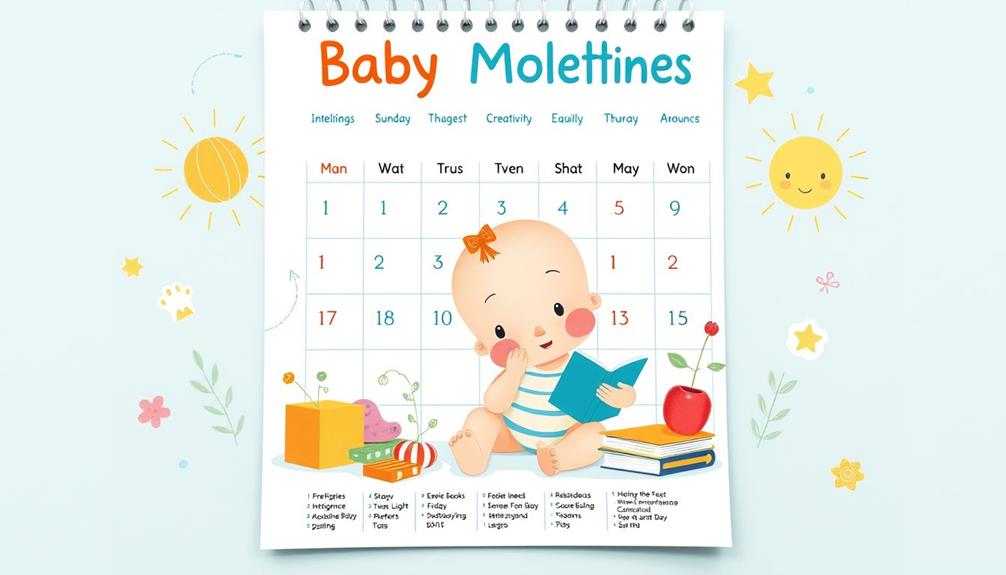Your dreams during pregnancy are more than just night-time stories; they reflect the profound emotional and physiological changes you're experiencing. Hormonal shifts lead to more vivid and emotionally intense dreams, often entwined with your anxieties about motherhood, labor, or newborn care. As your sleep patterns become fragmented, the frequency of these dreams tends to increase, especially in the third trimester. Documenting your dreams can help you process feelings and identify recurring themes. Managing stress and sleep hygiene can also enhance your overall sleep quality, which in turn can reduce the impact of distressing dreams. Discover more insights on this topic.
Key Takeaways
- Pregnancy significantly increases dream recall and frequency, particularly with heightened vividness in the third trimester due to hormonal changes.
- Common dream themes during pregnancy include anxieties about labor, motherhood, and baby-related scenarios reflecting emotional states.
- Distressing dreams often correlate with heightened anxiety and stress, signaling concerns about labor, finances, and newborn care.
- Maintaining good sleep hygiene and a consistent sleep schedule can improve sleep quality and reduce the impact of distressing dreams.
- Professional support and dream journaling are effective strategies for managing pregnancy-related nightmares and emotional well-being.
Changes in Dream Patterns
During pregnancy, many women notice considerable changes in their dream patterns. You might find yourself experiencing an increase in the frequency of dreams, especially as you enter the third trimester. These dreams often become more vivid and emotionally intense, likely due to hormonal fluctuations, particularly the rise in progesterone. This hormone can enhance the clarity of your dream imagery and amplify your emotional responses, making your dreams feel even more real.
Additionally, dreaming of deceased visits in dreams may also occur during this time as you process and reflect on your own feelings and those of your family.
You may also notice that you remember your dreams more vividly. Studies show that 88%-91% of pregnant women recall their dreams across various stages of pregnancy. Common themes in your dreams might revolve around your baby, labor anxieties, or even nightmares reflecting your fears about motherhood.
It's not uncommon to experience anxiety-related dreams during this time, as your emotional state considerably impacts your dream content.
As you navigate this journey, be aware that these changes in dream patterns can be a natural response to the excitement and worries that accompany pregnancy. Embracing these vivid experiences can help you process your feelings as you prepare for the arrival of your little one.
Emotional Influences on Dreams

Emotional influences play a notable role in shaping your dreams during pregnancy. Hormonal changes, particularly increased progesterone, can lead to more vivid and emotional dream experiences. Your emotional states, such as heightened anxiety or stress, can notably impact your dream content, often resulting in a higher prevalence of nightmares during pregnancy.
| Emotional State | Dream Content | Common Themes |
|---|---|---|
| Anxiety about Labor | Nightmares | Concerns about childbirth |
| Happiness | Positive pregnancy dreams | Joyful moments of motherhood |
| Stress | Distressing dreams | Financial worries, newborn care |
First-time mothers often report more pregnancy-themed dreams, reflecting their emotional experiences related to impending motherhood. Distressing dreams frequently mirror your concerns, whether about labor, finances, or caring for a newborn. Many women find that keeping a dream journal helps process these emotions and fears. Recognizing the interconnectedness of your daytime emotional health and nighttime dream content can provide valuable insights into your overall well-being during this transformative time.
Sleep Quality and Cycles

During pregnancy, your sleep cycles can change markedly, often leading to fragmented rest.
While you might experience an increase in REM sleep—essential for vivid dreaming—the overall quality of your sleep often declines due to discomfort and hormonal shifts.
Engaging in regular physical activity can also promote better sleep quality, as safe second trimester workouts may relieve tension and enhance relaxation.
To improve your sleep quality, you can adopt strategies like maintaining a consistent sleep schedule and practicing good sleep hygiene.
Sleep Cycle Alterations
Pregnancy often reshapes your sleep cycles, leading to both challenges and unique experiences. As hormonal fluctuations occur, you may notice an increase in REM sleep, which is essential for vivid dreams during pregnancy.
However, physical discomfort—like frequent bathroom visits and fetal movements—often disrupts your sleep patterns, resulting in fragmented sleep and multiple awakenings that can reduce overall sleep quality.
While you might find yourself sleeping longer, this extended duration allows for greater dream frequency and recall, with 20-25% of your sleep occurring in a dream state.
The emotional changes you experience can also greatly influence your sleep quality, mood, and dream patterns. For instance, heightened stress or joy may lead to more intense, memorable dreams.
To optimize your sleep hygiene during this time, consider sleeping on your left side and creating a dark, quiet environment.
These practices can help you achieve better sleep quality, making the most of the unique dreaming experiences that accompany pregnancy. Embracing these changes can enhance your overall well-being, allowing you to navigate this exciting phase with greater ease.
REM Sleep Importance
Your sleep cycles undergo significant changes during pregnancy, and understanding the role of REM sleep can help you navigate these shifts.
REM sleep, which accounts for about 20-25% of your total sleep time, is vital for emotional processing and memory consolidation. During pregnancy, you might notice increases in REM sleep, leading to more vivid and memorable dreams. However, hormonal fluctuations can disrupt your overall sleep quality, potentially resulting in fragmented sleep and reduced REM sleep duration.
The increased need for sleep during pregnancy, combined with daytime fatigue, can enhance your dreaming frequency. This might mean waking up feeling like you've experienced a movie in your sleep.
To optimize REM sleep quality, adopting good sleep hygiene practices is essential. Establishing a consistent sleep schedule and creating a comfortable sleep environment can make a significant difference.
Quality Sleep Strategies
Achieving quality sleep is essential for both physical health and emotional well-being during pregnancy. Hormonal fluctuations can disrupt your sleep cycles, reducing the amount of REM sleep you get, which is crucial for dreaming. You might find yourself waking frequently due to bathroom visits or fetal movements, leading to fragmented sleep and even nightmares.
To enhance your sleep quality, consider adopting good sleep hygiene practices. Stick to a consistent sleep schedule, aiming for the same bedtime each night. Create a dark, quiet environment to help you relax and fall asleep faster. Avoid large meals right before bed, as they can lead to discomfort and disrupt your sleep.
Another effective strategy is to sleep on your left side. This position promotes better blood flow and can reduce discomfort, helping you achieve deeper sleep.
Coping With Distressing Dreams

When you experience distressing dreams during pregnancy, documenting them can help you process your emotions and identify patterns.
It's also important to be aware that mental health support is essential during this time, as emotional changes can affect your overall well-being.
If these dreams become overwhelming, seeking professional support may provide you with effective coping strategies.
Documenting Your Dreams
Documenting dreams can be a powerful tool for pregnant women coping with distressing nighttime experiences. By keeping a dream journal, you can process emotions and fears, helping you identify recurring themes related to your distressing dreams.
This practice enhances your dream recall, providing insight into underlying anxieties about motherhood and childbirth.
Here are some key benefits of documenting your dreams:
- Increased dream recall: Writing down your dreams helps improve your memory of them.
- Emotional processing: Reflecting on distressing dreams can aid in coping with feelings of anxiety.
- Identifying themes: You may notice patterns that reveal your fears or concerns.
- Enhanced communication: Sharing your documented dreams with your partner fosters emotional support.
- Coping strategies: A therapist can guide you in developing effective strategies for managing distressing content.
Seeking Professional Support
Seeking professional support can be a crucial step in managing distressing dreams during pregnancy, especially if they become frequent or particularly unsettling.
You might find that documenting your dreams in a dream journal aids in processing emotions and fears, helping to alleviate the anxiety associated with them. Consulting with a therapist can provide valuable coping strategies for managing anxiety surrounding your pregnancy-related dreams and nightmares, particularly if they're causing significant distress.
Open communication with your partner about your dreams fosters emotional support, which can mitigate feelings of anxiety and isolation.
Recognizing that vivid dreams and nightmares are normal during this time can help alleviate worry, but persistent distressing dreams should be discussed with your healthcare provider for further guidance.
Research Insights on Pregnancy Dreams

Pregnant women often report a striking increase in vivid dreams, with studies showing that around 88% to 91% recall these intense experiences. This heightened dream activity is largely attributed to hormonal changes and increased emotional intensity during pregnancy.
The dreams of pregnant women often reflect their anxieties and hopes surrounding motherhood. Additionally, engaging in practices like gentle yoga stretches can help alleviate stress and promote relaxation, potentially influencing dream quality.
Here are some key insights from research on pregnancy dreams:
- Nightmare frequency in last trimester: Many women experience more nightmares as they approach delivery.
- Dream changes: Expectant mothers may notice shifts in the content and themes of their dreams.
- Dream-associated behaviors affecting pregnant women: These behaviors can include talking in sleep or restlessness, often linked to anxiety about their babies.
- Emotional intensity: The emotional weight of dreams can increase, manifesting as both joyful and distressing scenarios.
- Postpartum concerns: Studies show that postpartum women report higher anxiety levels in their dreams, indicating a shift in emotional well-being.
Types of Dreams During Pregnancy

Dreams during pregnancy can be a fascinating window into the expectant mother's psyche, showcasing a range of emotions and themes. You might find that dreams are normal during this transformative time, often reflecting the joys and anxieties of impending motherhood. Understanding the impact of emotional trauma can provide insight into how these dreams may manifest.
Many women experience anxiety dreams, which frequently surface as worries about labor, caring for a newborn, or financial stability. These dreams highlight the emotional stress that comes with preparing for a new life.
As you approach your third trimester, you may notice an increase in motherhood-related dreams, where you could find yourself holding, naming, or nurturing your baby.
However, not all dreams are pleasant. Nightmares can also arise, often stemming from fears related to pregnancy and childbirth. You might dream about losing the baby or facing complications during delivery, which can correlate with elevated anxiety levels.
Interestingly, research indicates that dream recall improves during pregnancy; you may remember 88-91% of your dreams. This increase often results from heightened awareness due to fetal movements and sleep disturbances.
Embrace these dreams, as they reflect your journey into motherhood.
Frequently Asked Questions
Can Dreams Affect Pregnancy?
Yes, dreams can affect your pregnancy. They often reflect your emotional state, which can influence your overall well-being.
If you experience vivid dreams or nightmares, it might indicate underlying anxieties or fears about childbirth or motherhood.
Processing these dreams through journaling or discussing them can help you manage your emotions.
This emotional awareness can lead to better mental health outcomes, allowing you to enjoy your pregnancy journey more fully.
What Is the Significance of Dreaming Pregnant?
Dreaming while pregnant is significant because it reflects your emotions, fears, and hopes about motherhood.
These vivid dreams can help you process anxieties about labor, baby safety, and your changing identity. By paying attention to your dreams, you gain insight into your mental state, which is essential during this transformative time.
Sharing and documenting these dreams can foster understanding and support, making it easier for you to navigate the complexities of pregnancy.
Are Pregnancy Dreams Good or Bad?
Pregnancy dreams can be both good and bad. You might experience vivid dreams that reflect your anxieties and hopes about motherhood, which can feel overwhelming at times.
However, these dreams often help you process your emotions and prepare for the changes ahead. While some may be distressing, they serve a purpose in emotional regulation.
Embrace the journey of your dreams; they're a normal part of your pregnancy experience.
What Hormone Causes Vivid Dreams in Pregnancy?
If you're wondering what hormone causes vivid dreams during pregnancy, it's primarily progesterone.
This hormone not only affects your sleep cycles but also heightens emotional states, leading to more intense and memorable dreams.
As progesterone levels rise, you might notice that your dreams become more vivid and emotionally charged, often reflecting themes related to motherhood.
Conclusion
In your journey through pregnancy, remember that dreams can reflect your emotions, influence your sleep, and even reveal your subconscious worries. Embrace the changes in your dream patterns, nurture your sleep quality, and cope with any distressing visions you might face. By understanding the science behind your dreams, you can gain insight into your pregnancy experience, connect with your feelings, and find comfort in this transformative time. After all, your dreams are a part of your unique story.










